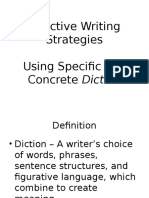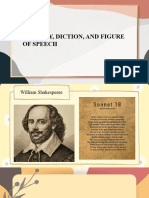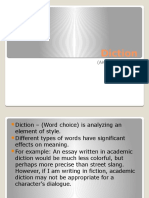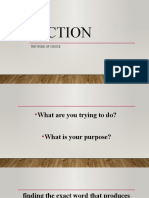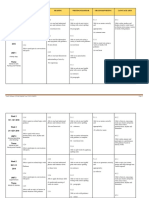Diction
In writing, diction is the strategic choice of words based on the audience, context, or situation. The short
answer is that diction is word choice. Different situations and audiences call for different styles. For
example, work and school matters require formal language, while conversations with friends use informal
language. It goes even deeper than that—consider the language you use when you’re speaking to a child
or trying to describe a feeling you can’t quite explain.
Diction vs. syntax
Diction is often confused with another language concept, syntax. While diction deals with the choice of
words, syntax deals with the arrangement and organization of words.
Tone vs diction
Tone:
o Tone refers to the attitude or emotional quality of the writer or speaker toward the
subject, audience, or both. It's the feeling or mood that the writing or speech conveys.
o It can be formal, informal, serious, humorous, sarcastic, sympathetic, etc.
o Example: In a poem, if the tone is somber, the reader may sense sadness or grief in the
words. A joyful tone might make the reader feel happy or light-hearted.
2. Diction:
o Diction refers to the choice of words and phrasing used by the writer or speaker.
o It involves selecting words based on their meaning, connotation, and appropriateness for
the audience and purpose. Diction helps set the tone but is not synonymous with it.
o Example: The use of formal words like "pursue" versus informal words like "go after"
can significantly affect the tone and formality of the writing.
Types of Diction in Writing
1. Formal diction
Formal diction uses the proper definitions of words in a mostly serious tone. This is the style
of workplaces, schools, and other formal environments. Formal language doesn’t take any risks and
can come across as bland or boring, but for the sake of clarity, it’s the best choice when speaking to
strangers or authority figures.
Example of formal diction:
Respectfully, I must disagree.
2. Informal diction
Informal diction is the opposite of formal diction; it involves the playful use of words, including
jokes and wordplay. Informal diction is the way you talk to the people closest to you, as opposed to
strangers or work colleagues. It’s best in casual situations, but it can sound out of place in serious
situations.
Example of informal diction:
No way, that’s not true at all.
� 3. Pedantic diction
Pedantic diction uses an excessive amount of academic or “big” words, as if the speaker is trying
to prove how smart they are. Pedantic diction comes across as arrogant in real life, but it’s nonetheless
useful as a writing tool. In fictional dialogue, it can show that a character is overly concerned with
appearing intelligent or sophisticated, as with Jay Gatsby in The Great Gatsby.
Example of pedantic diction:
In examination of your stance, I have identified some critical errors that I will now
expound on.
4. Pedestrian diction
Pedestrian diction is considered the opposite of pedantic; instead of trying to sound
smart, it’s trying to sound normal or common. Pedestrian diction, which doesn’t use fancy words
or slang, is thought to be how regular people talk. It’s the type of diction used by politicians when
speaking to diverse crowds or by people with technical knowledge when explaining something to
people without that knowledge.
Example of pedestrian diction:
I understand what you’re saying, but there’s something very important that you’re
missing.
5 . Slang
Diction with slang, an extension of informal diction, encompasses words and phrases that only a
particular type of person understands. Slang is often divided by generation, such as “sussy,” used by Gen
Z, and “nifty,” used by baby boomers. Slang can also encompass business jargon, which is slang that’s
understood only by people in a certain profession or trade.
Example of slang diction:
You’re full of it!
6. Colloquial diction
Similar to slang, colloquial diction refers to specific words or phrases used in particular
geographical locations. For example, people in the Northeast and on the West Coast of the US use the
word “soda,” those in the Northwest and Midwest say “pop,” and those in the Deep South use “coke”
as a generic term. All three words mean the same thing but reflect the language of a specific region.
Colloquial diction also includes special expressions that are popular only in certain areas.
Colloquial diction can also represent dialects of a language, such as the Argentine
dialect Rioplatense Spanish, whose grammar rules and pronunciation differ from those of
proper Spanish.
Example of colloquial diction:
Sounds like you’ve loaded the wrong wagon.
7. Abstract diction
Abstract diction refers to discussing something intangible, like an idea or emotion. It’s
hard to put abstract thoughts into words, so abstract diction often comes across as vague
or ambiguous.
Example of abstract diction:
� What you said doesn’t feel right.
8. Concrete diction
The opposite of abstract diction is concrete diction, which uses specific and direct language with
minimal ambiguity. Concrete diction describes things as they are, adhering to the proper definitions of
words and citing only the facts.
Example of concrete diction:
I understand that you believe you are correct, but you are missing a necessary piece of
information.
9. Poetic diction
Poetic diction makes use of rhymes, rhythm, and phonetics to make words sound pleasing
together. While it’s out of place in everyday speech and writing, it’s a necessary element of many
creative outlets such as poetry, song lyrics, rap, and to some extent speechwriting.
Example of poetic diction:
What a foolish and ignorant thing you just said
Hear my rebuttal and your cheeks will burn red
How is diction used in expository writing?
In expository writing, diction (word choice) is used to make the ideas clear, precise, and objective.
Writers carefully select words that are formal, neutral, and specific to explain information without
showing personal opinions or emotions. The goal is to communicate facts, analysis, or explanations in a
straightforward and professional way.
Good diction in expository writing avoids:
Slang
Casual or emotional words
Vague or abstract terms
Instead, it prefers:
Formal vocabulary
Concrete and specific words
Neutral and unbiased language
Example:
Poor Diction in Expository Writing:
"A lot of people think global warming is kinda bad for the Earth."
Good Diction in Expository Writing:
"Many scientists agree that global warming has significant negative impacts on the environment."



























